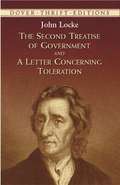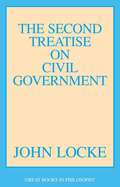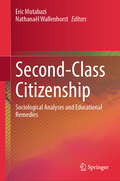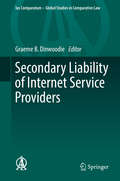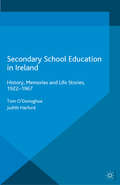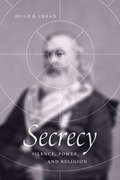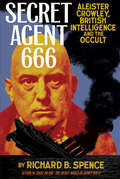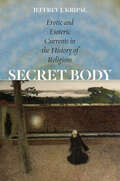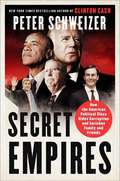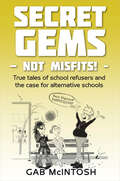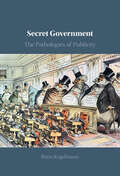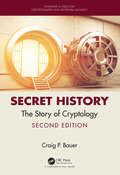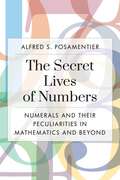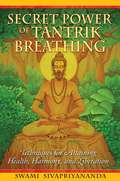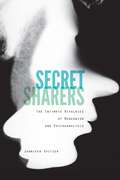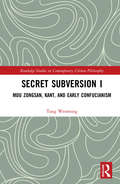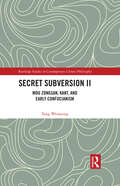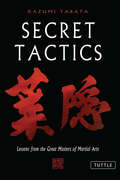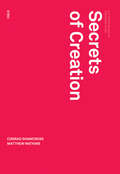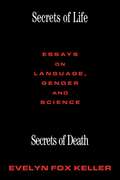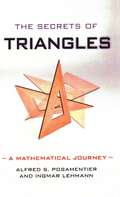- Table View
- List View
Second Treatise of Government and a Letter Concerning Toleration
by John Locke J. W. GoughLocke's main argument for toleration is a corollary of his theory of the nature of civil society. This book rests on basic principles of this theory merging civil liberties with political order.
Second Treatise on Civil Government (Great Books in Philosophy Ser.)
by John LockeAs one of the early Enlightenment philosophers in England, John Locke sought to bring reason and critical intelligence to the discussion of the origins of civil society. Endeavoring to reconstruct the nature and purpose of government, a social contract theory is proposed. The Second Treatise sets forth a detailed discussion of how civil society came to be and the nature of its inception. Locke's discussion of tacit consent, separation of powers, and the right of citizens to revolt against repressive governments, has made The Second Treatise one of the most influential essays in the history of political philosophy.
Second-Class Citizenship: Sociological Analyses and Educational Remedies
by Nathanaël Wallenhorst Eric MutabaziA number of features of the contemporary period are preventing people from exercising their citizenship: the acceleration and permanent change in the conditions shaping habitability of planet Earth, the digital and techno-scientific revolution, the rise of religious and political radicalisation, the explosion of social inequalities, the hegemony of the economic drive to maximise individual interests, etc. For many individuals, citizenship appears to be prevented at the first hurdle. What is more, though officially or legally, it is not possible to speak of second-class citizenship-- so what can be done when the actors themselves use such terminology? There is something essential here which must be taken into account as a basis for thinking about the social, its inequalities and its injustices. The authors of this book propose the notion of 'second-class citizenship' as a way of thinking about the scale of contemporary social and political inequalities. In view of this observation, the contributors outline a movement based on the conviction that education is the repository of the power to prepare for the future. How can we learn to build a shared world together and overcome the obstacles that prevent us from doing so? How can we learn new habits of relationships marked by responsibility and hospitality? The collective reflection in this book lends credence to the way in which players talk about their experience, even experiencing differences in their ability to participate in the mechanisms of power. This book presents empirical studies and conceptual tools for thinking about the impact of economic factors on the ways in which citizens participate in the decisions of power. This book is particularly suited for educators as well as policy-makers and researchers.
Secondary Liability of Internet Service Providers
by Graeme B. DinwoodieThis book analyses the doctrinal structure and content of secondary liability rules that hold internet service providers liable for the conduct of others, including the safe harbours (or immunities) of which they may take advantage, and the range of remedies that can be secured against such providers. Many such claims involve intellectual property infringement, but the treatment extends beyond that field of law. Because there are few formal international standards which govern the question of secondary liability, comprehension of the international landscape requires treatment of a broad range of national approaches. This book thus canvasses numerous jurisdictions across several continents, but presents these comparative studies thematically to highlight evolving commonalities and trans-border commercial practices that exist despite the lack of hard international law. The analysis presented in this book allows exploration not only of contemporary debates about the appropriate policy levers through which to regulate intermediaries, but also about the conceptual character of secondary liability rules.
Secondary School Education in Ireland: History, Memories and Life Stories, 1922 - 1967 (Historical Studies in Education)
by Tom O'Donoghue Judith HarfordAdopting a life story approach, this book explores the memories of those who attended Irish secondary schools prior to 1967. It serves to initiate and enhance the practice of remembering secondary school education amongst those who attended secondary schools not just in Ireland, but around the world.
Secrecy: Silence, Power, and Religion (Routledge Handbooks In Religion Ser.)
by Hugh B. UrbanThe powers of political secrecy and social spectacle have been taken to surreal extremes recently. Witness the twin terrors of a president who refuses to disclose dealings with foreign powers while the private data of ordinary citizens is stolen and marketed in order to manipulate consumer preferences and voting outcomes. We have become accustomed to thinking about secrecy in political terms and personal privacy terms. In this bracing, new work, Hugh Urban wants us to focus these same powers of observation on the role of secrecy in religion. With Secrecy, Urban investigates several revealing instances of the power of secrecy in religion, including nineteenth-century Scottish Rite Freemasonry, the sexual magic of a Russian-born Parisian mystic; the white supremacist BrüderSchweigen or “Silent Brotherhood” movement of the 1980s, the Five Percenters, and the Church of Scientology. An electrifying read, Secrecy is the culmination of decades of Urban’s reflections on a vexed, ever-present subject.
Secret Agent 666: Aleister Crowley, British Intelligence and the Occult
by Richard B. SpenceAleister Crowley is best known today as a founding father of modern occultism. His wide, hypnotic eyes peer at us from the cover of The Beatles' Sgt. Pepper's Lonely Hearts Club Band, and his influence can be found everywhere in popular culture.Crowley, also known as the Great Beast, has been the subject of several biographies, some painting him as a misunderstood genius, others as a manipulative charlatan. None of them have looked seriously at his career as an agent of British Intelligence.Using documents gleaned from British, American, French, and Italian archives, Secret Agent 666 sensationally reveals that Crowley played a major role in the sinking of the Lusitania, a plot to overthrow the government of Spain, the thwarting of Irish and Indian nationalist conspiracies, and the 1941 flight of Rudolf Hess.Author Richard B. Spence argues that Crowley--in his own unconventional way--was a patriotic Englishman who endured years of public vilification in part to mask his role as a secret agent.The verification of the Great Beast's participation in the twentieth century's most astounding government plots will likely blow the minds of history buff s and occult aficionados alike.Author Richard B. Spence can be seen on various documentaries on the History Channel and is a consultant for Washington, DC's International Spy Museum. He is also the author of Trust No One: The Secret World of Sidney Reilly (Feral House).
Secret Body: Erotic and Esoteric Currents in the History of Religions
by Jeffrey J. KripalOver the course of his twenty-five-year career, Jeffrey J. Kripal’s study of religion has had two major areas of focus: the erotic expression of mystical experience and the rise of the paranormal in American culture. This book brings these two halves together in surprising ways through a blend of memoir, manifesto, and anthology, drawing new connections between these two realms of human experience and revealing Kripal’s body of work to be a dynamic whole that has the potential to renew and reshape the study of religion. Kripal tells his story, biographically, historically and politically contextualizing each of the six books of his Chicago corpus, from Kali’s Child to Mutants and Mystics, all the while answering his censors and critics and exploring new implications of his thought. In the process, he begins to sketch out a speculative “new comparativism” in twenty theses. The result is a new vision for the study of religion, one that takes in the best of the past, engages with outside critiques from the sciences and the humanities, and begins to blaze a new positive path forward. A major work decades in the making, Secret Body will become a landmark in the study of religion.
Secret Empires: How The American Political Class Hides Corruption And Enriches Family And Friends
by Peter SchweizerPeter Schweizer has been fighting corruption—and winning—for years. In Throw Them All Out, he exposed insider trading by members of Congress, leading to the passage of the STOCK Act. In Extortion, he uncovered how politicians use mafia-like tactics to enrich themselves. And in Clinton Cash, he revealed the Clintons’ massive money machine and sparked an FBI investigation. <P><P> Now he explains how a new corruption has taken hold, involving larger sums of money than ever before. Stuffing tens of thousands of dollars into a freezer has morphed into multibillion-dollar equity deals done in the dark corners of the world. <P><P> An American bank opening in China would be prohibited by US law from hiring a slew of family members of top Chinese politicians. However, a Chinese bank opening in America can hire anyone it wants. It can even invite the friends and families of American politicians to invest in can’t-lose deals. <P><P> President Donald Trump’s children have made front pages across the world for their dicey transactions. However, the media has barely looked into questionable deals made by those close to Barack Obama, Joe Biden, John Kerry, Mitch McConnell, and lesser-known politicians who have been in the game longer. <P><P> In many parts of the world, the children of powerful political figures go into business and profit handsomely, not necessarily because they are good at it, but because people want to curry favor with their influential parents. This is a relatively new phenomenon in the United States. But for relatives of some prominent political families, we may already be talking about hundreds of millions of dollars. <P><P> Deeply researched and packed with shocking revelations, Secret Empires identifies public servants who cannot be trusted and provides a path toward a more accountable government.
Secret Gems - not Misfits!: True tales of school refusers and the case for alternative schools
by Gab McIntoshQuirky learning and unexpected happiness for school refusers at alternative schools - really? Who would have thought that school refusers turn out to be secret gems rather than sad misfits? The reader learns how the principal began her alternative schools with no money, no teaching resources, no premises, and few guidelines. One trained teacher; she was it. The only truly dependable resource was unhappy school kids, more than anyone expected. The results are both surprising and delightful. “Secret Gems - not Misfits! True tales of school refusers and the case for alternative schools” puts forwards the case for alternative schools and why they are so desperately needed all over the country. In an age where teachers are leaving their profession in droves, where kids academic results seem to stagnate, or plummet, alternative schools provide a refreshing insight into how we can do schooling differently and make education enjoyable again for teachers, parents and all kids, but particularly those kids called to the beat of a drum.
Secret Government: The Pathologies of Publicity
by Brian KogelmannAmong politicians and policy-makers it is almost universally assumed that more transparency in government is better. Until now, philosophers have almost completely ignored the topic of transparency, and when it is discussed there seems to be an assumption (shared with politicians and policy-makers) that increased transparency is a good thing, which results in no serious attempt to justify it. In this book Brian Kogelmann shows that the standard narrative is false and that many arguments in defence of transparency are weak. He offers a comprehensive philosophical analysis of transparency in government, examining both abstract normative defences of transparency, and transparency's role in the theory of institutional design. His book shows that even when the arguments in favour of transparency are compelling, the costs associated with it are just as forceful as the original arguments themselves, and that strong arguments can be made in defence of more opaque institutions.
Secret History: The Story of Cryptology (Chapman & Hall/CRC Cryptography and Network Security Series #76)
by Craig BauerThe first edition of this award-winning book attracted a wide audience. This second edition is both a joy to read and a useful classroom tool. Unlike traditional textbooks, it requires no mathematical prerequisites and can be read around the mathematics presented. If used as a textbook, the mathematics can be prioritized, with a book both students and instructors will enjoy reading. Secret History: The Story of Cryptology, Second Edition incorporates new material concerning various eras in the long history of cryptology. Much has happened concerning the political aspects of cryptology since the first edition appeared. The still unfolding story is updated here. The first edition of this book contained chapters devoted to the cracking of German and Japanese systems during World War II. Now the other side of this cipher war is also told, that is, how the United States was able to come up with systems that were never broken. The text is in two parts. Part I presents classic cryptology from ancient times through World War II. Part II examines modern computer cryptology. With numerous real-world examples and extensive references, the author skillfully balances the history with mathematical details, providing readers with a sound foundation in this dynamic field. FEATURES Presents a chronological development of key concepts Includes the Vigenère cipher, the one-time pad, transposition ciphers, Jefferson’s wheel cipher, Playfair cipher, ADFGX, matrix encryption, Enigma, Purple, and other classic methods Looks at the work of Claude Shannon, the origin of the National Security Agency, elliptic curve cryptography, the Data Encryption Standard, the Advanced Encryption Standard, public-key cryptography, and many other topics New chapters detail SIGABA and SIGSALY, successful systems used during World War II for text and speech, respectively Includes quantum cryptography and the impact of quantum computers
Secret Kindness Agents: How Small Acts of Kindness Really Can Change the World
by Ferial PearsonMoved by the Sandy Hook Elementary School tragedy, Ferial Pearson wondered if a simple act of kindness could change a life. She thought of the school where she taught and the students she guided every day and wondered, what would happen if we started secretly carrying out small acts of kindness in school? Could a modest act of compassion really change the course of a life? She posed the question to her students. They didn't have the answers but they were willing to find out. And so they became the Secret Kindness Agents. They not only changed the lives of those they met, they changed their own. Their hope, their hearts, and their hunger for happiness will inspire you to change your small corner of the world, in your own way, for the better. Let them show you how they did it, and how you can do the same.
Secret Lives of Numbers: Numerals and Their Peculiarities in Mathematics and Beyond
by Alfred S. PosamentierWe see numbers on automobile license plates, addresses, weather reports, and, of course, on our smartphones. Yet we look at these numbers for their role as descriptors, not as an entity in and unto themselves. Each number has its own history of meaning, usage, and connotation in the larger world. The Secret Lives of Numbers takes readers on a journey through integers, considering their numerological assignments as well as their significance beyond mathematics and in the realm of popular culture. Of course we all know that the number 13 carries a certain value of unluckiness with it. The phobia of the number is called Triskaidekaphobia; Franklin Delano Roosevelt was known to invite and disinvite guests to parties to avoid having 13 people in attendance; high-rise buildings often skip the 13th floor out of superstition. There are many explanations as to how the number 13 received this negative honor, but from a mathematical point of view, the number 13 is also the smallest prime number that when its digits are reversed is also a prime number. It is honored with a place among the Fibonacci numbers and integral Pythagorean triples, as well as many other interesting and lesser-known occurrences. In The Secret Lives of Numbers, popular mathematician Alfred S. Posamentier provides short and engaging mini-biographies of more than 100 numbers, starting with 1 and featuring some especially interesting numbers –like 6,174, a number with most unusual properties –to provide readers with a more comprehensive picture of the lives of numbers both mathematically and socially. ,
Secret Power of Tantrik Breathing: Techniques for Attaining Health, Harmony, and Liberation
by Swami SivapriyanandaExplores the secrets and benefits of alternate nostril breathing practices • Includes breathing techniques to help overcome infertility, bad luck, and illnesses • Explains the interactions of the vital energy of breath with the chakras and energy channels (nadis) There is an intimate relationship between breathing and our emotional states. When we are nervous or excited, our breath rate increases. Conversely, if we alter our rate of breathing, we can alter our emotional state. The ancient civilization of India developed methods for changing the emotions and states of consciousness through yogic meditation and pranayama (breath control). Secret Power of Tantrik Breathing teaches the advanced pranayama system of svaraodaya, which is based on the fact that we normally breathe freely through only one nostril at a time. In a healthy person, breathing changes roughly every one and a half hours from one nostril to the other, with each nostril imparting different qualities to one’s mental and physical state. The left nostril is cool, soothing, passive, and feminine in nature; the right is warm, energizing, active, and masculine. When the breath remains in one nostril for longer than normal, mental and physical illness can result. The goal of svaraodaya is to harmonize the breath from each nostril with the life task needing to be accomplished. This book explains how to practice this breath control and how the vital energy of breath interacts with the chakras and energy channels (nadis) to create overall balance and harmony. It also includes svaraodaya breathing techniques to help overcome illnesses, infertility, and bad luck; make predictions; and attain liberation from the cycle of rebirth.
Secret Reports on Nazi Germany: The Frankfurt School Contribution to the War Effort
by Herbert Marcuse Franz Neumann Otto KirchheimerA groundbreaking book that gathers key wartime intelligence reportsDuring the Second World War, three prominent members of the Frankfurt School—Franz Neumann, Herbert Marcuse, and Otto Kirchheimer—worked as intelligence analysts for the Office of Strategic Services, the wartime forerunner of the CIA. This book brings together their most important intelligence reports on Nazi Germany, most of them published here for the first time.These reports provide a fresh perspective on Hitler's regime and the Second World War, and a fascinating window on Frankfurt School critical theory. They develop a detailed analysis of Nazism as a social and economic system and the role of anti-Semitism in Nazism, as well as a coherent plan for the reconstruction of postwar Germany as a democratic political system with a socialist economy. These reports played a significant role in the development of postwar Allied policy, including denazification and the preparation of the Nuremberg Trials. They also reveal how wartime intelligence analysis shaped the intellectual agendas of these three important German-Jewish scholars who fled Nazi persecution prior to the war.Secret Reports on Nazi Germany features a foreword by Raymond Geuss as well as a comprehensive general introduction by Raffaele Laudani that puts these writings in historical and intellectual context.
Secret Sharers: The Intimate Rivalries of Modernism and Psychoanalysis
by Jennifer SpitzerSecret Sharers traces a genealogy of secret sharing between literary modernism and psychoanalysis, focusing on the productive entanglements and intense competitive rivalries that helped shape Anglo-American modernism as a field. As Jennifer Spitzer reveals, such rivalries played out in explicit criticism, inventive misreadings, and revisions of Freudian forms—from D. H. Lawrence’s re-descriptions of the unconscious to Vladimir Nabokov’s parodies of the psychoanalytic case study. While some modernists engaged directly with Freud and Freudian psychoanalysis with unmistakable rivalry and critique, others wrestled in more complex ways with Freud’s legacy. The key protagonists of this study—D. H. Lawrence, Virginia Woolf, W. H. Auden, and Vladimir Nabokov—are noteworthy for the way they engaged with, popularized, and revised the terms of Freudian psychoanalysis, while also struggling with it as an encroaching discourse. Modernists read psychoanalysis, misread psychoanalysis, and sometimes refused to read it altogether, while expressing anxiety about being read by psychoanalysis—subjecting themselves and their art to psychoanalytic interpretations.As analysts, such as Freud, Ernest Jones, and Alfred Kuttner, turned to literature and art to illustrate psychoanalytic theories, modernists sought to counter such reductive narratives by envisioning competing formulations of the relationship between literature and psychic life. Modernists often expressed ambivalence about the probing, symptomatic style of psychoanalytic interpretation and responded with a re-doubling of arguments for aesthetic autonomy, formal self-consciousness, and amateurism. Secret Sharers reveals how modernists transformed the hermeneutic and diagnostic priorities of psychoanalysis into novel aesthetic strategies and distinctive modes of epistemological and critical engagement. In reassessing the historical and intellectual legacies of modernism, this book suggests that modernist responses to psychoanalytic criticism anticipate more recent critical debates about the value of “symptomatic” reading and the “hermeneutics of suspicion.”
Secret Subversion I: Mou Zongsan, Kant, and Early Confucianism (Routledge Studies in Contemporary Chinese Philosophy)
by Tang WenmingMou Zongsan (1909–1995), one of the representatives of Modern Confucianism, belongs to the most important Chinese philosophers of the twentieth century. From a more traditional Confucian perspective, this book makes a critical analysis on Mou’s "moral metaphysics," mainly his thoughts about Confucian ethos. The author observes that Mou simplifies Confucian ethos rooted in various and specific environments, making them equal to modern ethics, which is a subversion of the ethical order of life advocated by traditional Confucianism. The author believes, also, that Mou has twisted Confucian ethos systematically by introducing Kant’s concept of autonomy into the interpretation of Confucian thoughts. Scholars and students in Chinese philosophy, especially those in Confucian studies, will be attracted by this book. Also, it will appeal to readers interested in comparative philosophy.
Secret Subversion II: Mou Zongsan, Kant, and Early Confucianism (Routledge Studies in Contemporary Chinese Philosophy)
by Tang WenmingThis title critically examines Mou Zongsan’s philosophical system of moral metaphysics on the level of metaphysics and history philosophy, which combines Confucianism and Kantianism philosophy. Mou Zongsan (1909–1995) is one of the representatives of Modern Confucianism and an important Chinese philosopher of the twentieth century. The two-volume set looks into the problems in the moral metaphysics by Mou and his systematic subversion of Confucianism on three levels: ethics, metaphysics and historical philosophy. In this second volume the author critiques Mou’s philosophical development of Confucianism on the latter two levels. The first part analyzes Mou’s view on conscience as ontology and his interpretation of the heavenly principles in Confucianism, arguing that his theory in fact abolishes Confucian cosmology based on modern scientific concepts and speaks for modern humanity. The second part focuses on Mou’s remolding of historical philosophy based on the concept of freedom of Kant, Hegel, and modern Western philosophy, then assesses his ideological distortions of historical and political concepts in the Confucian tradition.The title will appeal to scholars, students and philosophers interested in Chinese philosophy, Confucian ethics, Neo-Confucianism, and Comparative Philosophy.
Secret Tactics
by Kazumi TabataIn the tradition of The Martial Artist's Book of Five Rings, one of America's most experienced teachers of karate offers new interpretations of fundamental martial arts texts. The book includes new translations of essays on leadership, correct behavior, character, and values. "Hereditary Manual of Fighting Techniques" by Yagyu Tajimanokami Munenori explores the relationship between Zen philosophy and warfare and the mental preparation for successful fighting. In "The Ultimate Sword," Takuan Soho describes the unremitting effort that must be undertaken to become a true master of strategy. He uses key aspects of sword-fighting strategy to shed light on the path to self-realization in "The Miracle of Immovable Wisdom." Kotoda Yahei Toshisada emphasizes the importance of training and learning techniques over theory in 'Technical Study of Kenpo." In "The School of Two Heavens," Musashi Miyamoto applies the principles of sword fighting to military arts and politics. Mastuura Saizan focuses on strengthening the weak points of the human mind, and exploiting the natural movements of the human body, in "Jyoseihi Kendan." And "Tengu's Dialogue on the Martial Arts" by Issai Chosanshi is a manual for students of the martial arts, presented in the form of a dialogue with a master.
Secret Tactics
by Kazumi TabataIn the tradition of The Martial Artist's Book of Five Rings, one of America's most experienced teachers of karate offers new interpretations of fundamental martial arts texts. The book includes new translations of essays on leadership, correct behavior, character, and values. "Hereditary Manual of Fighting Techniques" by Yagyu Tajimanokami Munenori explores the relationship between Zen philosophy and warfare and the mental preparation for successful fighting. In "The Ultimate Sword," Takuan Soho describes the unremitting effort that must be undertaken to become a true master of strategy. He uses key aspects of sword-fighting strategy to shed light on the path to self-realization in "The Miracle of Immovable Wisdom." Kotoda Yahei Toshisada emphasizes the importance of training and learning techniques over theory in 'Technical Study of Kenpo." In "The School of Two Heavens," Musashi Miyamoto applies the principles of sword fighting to military arts and politics. Mastuura Saizan focuses on strengthening the weak points of the human mind, and exploiting the natural movements of the human body, in "Jyoseihi Kendan." And "Tengu's Dialogue on the Martial Arts" by Issai Chosanshi is a manual for students of the martial arts, presented in the form of a dialogue with a master.
Secrets and Leaks
by Rahul SagarSecrets and Leaks examines the complex relationships among executive power, national security, and secrecy. State secrecy is vital for national security, but it can also be used to conceal wrongdoing. How then can we ensure that this power is used responsibly? Typically, the onus is put on lawmakers and judges, who are expected to oversee the executive. Yet because these actors lack access to the relevant information and the ability to determine the harm likely to be caused by its disclosure, they often defer to the executive's claims about the need for secrecy. As a result, potential abuses are more often exposed by unauthorized disclosures published in the press.But should such disclosures, which violate the law, be condoned? Drawing on several cases, Rahul Sagar argues that though whistleblowing can be morally justified, the fear of retaliation usually prompts officials to act anonymously--that is, to "leak" information. As a result, it becomes difficult for the public to discern when an unauthorized disclosure is intended to further partisan interests. Because such disclosures are the only credible means of checking the executive, Sagar writes, they must be tolerated. However, the public should treat such disclosures skeptically and subject irresponsible journalism to concerted criticism.
Secrets of Creation: The Mystery Of The Prime Numbers (Urbanomic / Redactions)
by Robin Mackay Conrad Shawcross Matthew WatkinsAn artist and a mathematician debate, find common ground, and jointly create an assemblage that is neither (or both) an artwork and a mathematical model.A week-long residency project brought together artist Conrad Shawcross and mathematician Matthew Watkins to reflect on the ways in which artists use (or misuse) scientific and mathematical concepts. Secrets of Creation documents this fascinating meeting of worlds, presenting both the week's discussions and debates, and the project upon which Shawcross and Watkins subsequently embarked.Navigating a route that tacked between formalism and natural language, experts and laymen, quantity and quality, poetics and mechanics, Shawcross and Watkins gradually forged a shared discourse in which the concerns of the artist and those of the mathematician could find a common ground. The project ended with their joint creation of an assemblage that was neither (or both) an artwork and a mathematical model.
Secrets of Life, Secrets of Death: Essays on Science and Culture
by Evelyn Fox KellerFirst published in 1993. Routledge is an imprint of Taylor & Francis, an informa company.
Secrets of Triangles: A Mathematical Journey
by Alfred S. Posamentier Ingmar LehmannRequiring no more than a knowledge of high school mathematics and written in clear and accessible language, this book will give all readers a new insight into some of the most enjoyable and fascinating aspects of geometry. Everyone knows what a triangle is, yet very few people appreciate that the common three-sided figure holds many intriguing "secrets." For example, if a circle is inscribed in any random triangle and then three lines are drawn from the three points of tangency to the opposite vertices of the triangle, these lines will always meet at a common point-no matter what the shape of the triangle. This and many more interesting geometrical properties are revealed in this entertaining and illuminating book about geometry. Flying in the face of the common impression that mathematics is usually dry and intimidating, this book proves that this sometimes-daunting, abstract discipline can be both fun and intellectually stimulating. The authors, two veteran math educators, explore the multitude of surprising relationships connected with triangles and show some clever approaches to constructing triangles using a straightedge and a compass. Readers will learn how they can improve their problem-solving skills by performing these triangle constructions. The lines, points, and circles related to triangles harbor countless surprising relationships that are presented here in a very engaging fashion.
